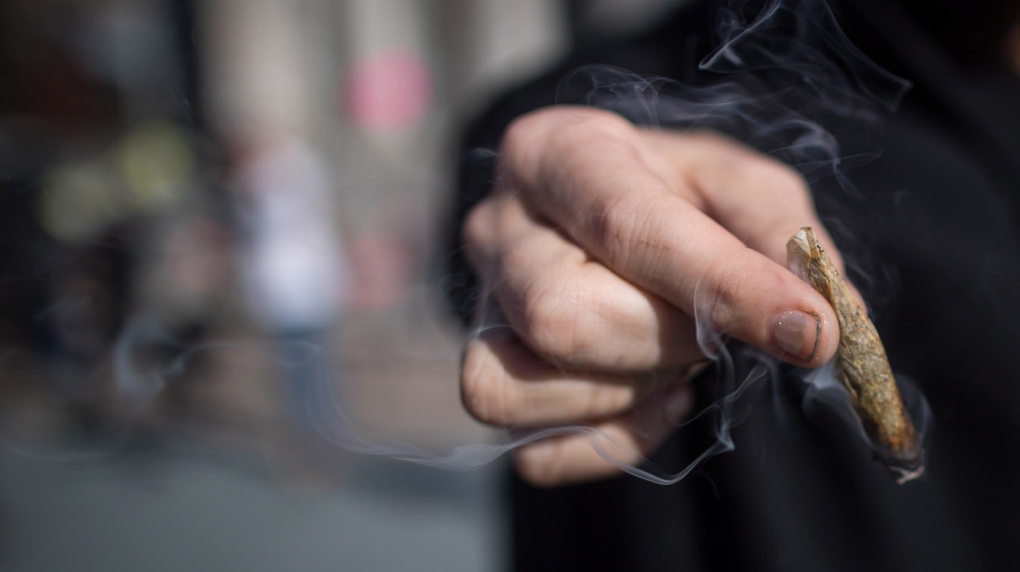Cannabis found in twice as many injured drivers since legalization: B.C. study
 A man holds a joint while smoking marijuana to celebrate the legalization of recreational cannabis, in Vancouver, on Wednesday October 17, 2018. (THE CANADIAN PRESS/Darryl Dyck)
A man holds a joint while smoking marijuana to celebrate the legalization of recreational cannabis, in Vancouver, on Wednesday October 17, 2018. (THE CANADIAN PRESS/Darryl Dyck)
A new study out of the University of British Columbia suggests that cannabis is being detected in twice as many injured drivers since its 2018 legalization.
Dr. Jeffrey Brubacher, an associate professor at UBC and the principal investigator of the study, says before cannabis was legalized, 3.8 per cent of injured drivers had THC concentrations above the Canadian legal driving limit of two nanograms/ml. That percentage rose to 8.6 per cent after cannabis was legalized.
The amount of injured drivers with a THC concentration of above five nanograms/ml in their system also went up, from 1.1 per cent pre-legalization to 3.5 per cent after legalization.
"It's concerning that we're seeing such a dramatic increase," Brubacher says in a news release. "There are serious risks associated with driving after cannabis use. Our findings suggests more is needed to deter this dangerous behaviour in light of legalization."
Brubacher and his colleagues analyzed blood samples from 4,339 "moderately injured" drivers who received treatment at four B.C. trauma centres between 2013 and 2020.
Researchers found that those over the age of 50 made up the largest increase of drivers injured while under the influence of cannabis.
The study, published in the New England Journal of Medicine, also suggests there weren't any significant changes in drivers testing positive for alcohol, on its own, or in combination with THC.
The federal government amended the Criminal Code when cannabis was legalized, which gave police more powers to test drivers who they suspected might be driving under the influence of drugs.
But Brubacher says the findings of the study show that it wasn't enough to deter cannabis impaired driving.
“We hope that policymakers will use our findings to design public information campaigns and enforcement measures that encourage drivers, especially older drivers, to separate cannabis use from driving. At the same time, it is important not to lose sight of alcohol impaired driving, which is extremely high risk, especially when combined with cannabis.”
The study suggests that while cannabis use is often associated with cognitive deficits, the presence of THC in the blood is not always an indicator that a collision was caused by cannabis impairment.
"Detecting cannabis, especially at low concentrations, doesn't necessarily mean a driver is impaired," Brubacher adds. "But the risk is real with higher THC levels, which is why it’s so important that we continue to assess and respond to the impact that legalization is having on road safety.”
Brubacher says his team is now expanding their research efforts to 15 trauma centres across Canada.
They plan to collect more information on the prevalence of cannabis, alcohol and other substances in injured drivers, which they hope could help guide traffic policies both nationally and provincially moving forward.
CTVNews.ca Top Stories

Toronto mother now facing murder charge in death of four-month old baby
Toronto police say they have charged a mother with second-degree murder following the death of her infant, who was found with critical injuries in midtown Toronto last week.
Justin Trudeau defends spending record on military amid fresh criticism
Prime Minister Justin Trudeau is defending his government's record on supporting national defence, following fresh criticism that Canada is failing to live up to its NATO defence-spending commitments.
French mass rape trial prosecutors demand maximum sentence for Gisele Pelicot's ex-husband
A mammoth rape trial in France moved into a new phase Monday as prosecutors began to lay out the verdicts and punishments they want for dozens of men accused of raping Gisele Pelicot while she was drugged and rendered unconscious by her husband.
Should sex abuse evidence set the Menendez brothers free? A judge will decide
A judge will decide Monday whether new evidence warrants a re-examination of the convictions of Erik and Lyle Menendez in the shotgun murders of their parents in their Beverly Hills home more than 30 years ago.
CEOs say Canada's failure to hit NATO targets by 2030 like playing economic 'Russian Roulette'
The federal government risks jeopardizing the economy unless it meets its NATO military alliance spending obligations within the next five years, says the Business Council of Canada.
Elliot Lake, Ont., woman charged with choking neighbour's dog
An intoxicated woman in Elliot Lake has been charged with breaking into her neighbour's apartment and choking their dog.
'A first for everyone': Toronto traffic forces Utah Hockey Club to walk to Leafs game
The Utah Hockey Club got the full Toronto experience Sunday night ahead of their first-ever matchup against the Maple Leafs—bumper-to-bumper traffic that forced the team to walk to the game.
Horse's head and pregnant cow used in 'barbaric' mafia threat in Sicily
The discovery of a severed horse head, and a cow quartered with its bloodied dead calf on top, have rattled a Sicilian town, with authorities treating the incident as a mafia threat.
WATCH Brawl erupts in Serbian parliament
Scuffles broke out in the Serbian parliament on Monday after opposition legislators raised banners accusing the ruling coalition of trying to shirk responsibility for the collapse of a train station roof that killed 15 people earlier this month.
































